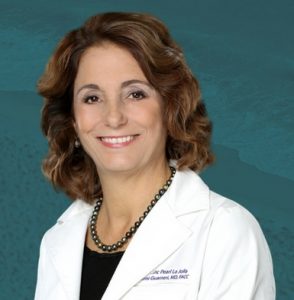Live Better Now – Part 1
 Mimi Guarneri, MD, a founding board member of the American Board of Integrative Medicine® (ABOIM®) and a board-certified physician in cardiovascular disease, internal medicine, and integrative holistic medicine, exhorts viewers of her public television special to choose the path to health. Whatever our health challenges are, she says, they can be improved through a comprehensive process that involves seven simple steps.
Mimi Guarneri, MD, a founding board member of the American Board of Integrative Medicine® (ABOIM®) and a board-certified physician in cardiovascular disease, internal medicine, and integrative holistic medicine, exhorts viewers of her public television special to choose the path to health. Whatever our health challenges are, she says, they can be improved through a comprehensive process that involves seven simple steps.
The Science of Health Creation
Dr. Guarneri began her career in 1994 as an interventional cardiologist, performing procedures like stent placement and balloon angioplasty. She was soon performing more than 700 surgeries a year but came to realize that she barely knew her patients. Not only that, she was seeing the same patients every few months. At the root of her dissatisfaction was the profound disconnect she perceived between the treatment she provided for her patients and the measures they could take to stay healthy – between the science of disease, as practiced by conventional medicine, and the science of health creation.
In 1996, Dr. Dean Ornish, MD, a renowned physician and researcher, asked Dr. Guarneri to teach a group of patients yoga and meditation, how to exercise, how to follow a vegetarian diet and to give them group support along the way. Skeptical, she nonetheless embraced the challenge.
A year later, the results were startling. Patients lost weight, their chest pain decreased by up to 91 percent, and their cholesterol levels fell dramatically. She realized that as knowledgeable as she was in the science of disease, her knowledge in the science of health was limited, and her patients were receiving no information about health creation. So Dr. Guarneri embarked on a career change. She learned as much as possible about the science of health and began sharing this knowledge with patients. After 25 years of caring for heart patients with every conceivable risk factor, she now firmly believes that chronic disease is preventable and, in many cases, reversible.
Treating Chronic Conditions
Dr. Guarneri makes clear that conventional medicine has its place in acute care. It falls short, however, in its treatment of chronic conditions. Frequent knee pain? Take Advil. Constant heartburn? Pop an antacid. “A pill for every ill,” she says. “Name it, blame it, tame it.” Whereas conventional medicine prescribes medicines for chronic conditions, the science of health focuses on disease prevention.
“We are a system,” Dr. Guarneri emphasizes. “What’s good for the heart is good for the brain.” If you’re given a diagnosis, whether for heart disease, high blood pressure, or arthritis, you should ask why. What’s causing it? What’s the root cause?
People may fault their genetics for their chronic illness, but genes are not destiny. Lifestyle trumps genetic risk. Dr. Guarneri cites a study of an Amish community that had the obesity gene but whose members were not obese. Researchers concluded that the community’s physical activity – members took 17,000 steps a day on average – helped them avoid obesity.
In another study conducted by Dr. Ornish, men with prostate cancer were taught a vegan diet, yoga, meditation, and exercise. The study found that 500 cancer genes were downregulated as a result of these lifestyle changes.
Now that we know that lifestyle makes a difference, Dr. Guarneri says, we should seek to understand the root causes and final common pathways of disease, namely inflammation, oxidative stress, and immune dysfunction.
Let’s consider inflammation and the 10 causes of hidden inflammation:
- Sugar
- Converted sugar
- Food sensitivities, such as to gluten, dairy, corn, eggs, and citrus
- Infections
- Environmental toxins
- Midline weight
- Stress
- Air pollution
- Chronic disease
- Sleep disturbance
In part two, we will examine how seven simple steps can help us avoid inflammation and achieve optimal health.






